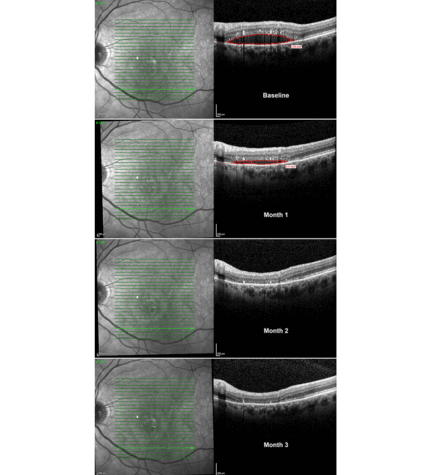PHLADELPHIA — Losing your vision can be a terrifying experience. One of the common causes of blindness in seniors is macular degeneration (AMD), where leaky blood vessels form under the retina. Treatments for this condition can be both painful and expensive, but a new study says there may be an unlikely solution. A drug for Parkinson’s disease is showing promise in reducing the effects of AMD without creating harmful side-effects.
The report finds the drug levodopa is a safe and commonly available medication which reduces a patient’s need for regular AMD injections. The study continues earlier research which finds patients being treated for various movement disorders, like Parkinson’s, are significantly less likely to develop macular degeneration while taking levodopa.
“Levodopa has a receptor (GPR143) selectively expressed on pigmented cells. This receptor can be supportive of retinal health and survival, which led to the development of our hypothesis that it may prevent or treat AMD,” Robert W. Snyder from the University of Arizona says in a media release.
Macular degeneration and vision loss
Study authors say more than 15 percent of Americans over 70 suffer from macular degeneration. One of the more severe varieties is Neovascular AMD (nAMD). This type of abnormal blood vessel growth is the result of vascular endothelial growth factor (VEGF), the buildup of both fluid and blood in the space beneath the retinal.
Less than 20% of AMD patients have this form of the disease, but it accounts for 90 percent of vision loss cases. The normal treatment involves frequent injections to block VEGF, but they’re both expensive and painful for the patient.
Can levodopa keep you from losing your sight?

The two-part study tests the drug’s ability to stop changes caused by nAMD while also seeing how patients tolerate taking the medication. Researchers were also looking to see if levodopa can delay the need for anti-VEGF injections.
In part one, 20 patients who had just been diagnosed with nAMD took a small dose of levodopa each day for one month. In part two, those patients as well as 14 patients receiving anti-VEGF treatments were then given increasingly larger doses of levodopa to examine their tolerance to the medicine.
The results reveal retinal fluid decreased by 29 percent in the first month alone. After six months, the drop in fluid leakage stayed constant. Researchers say the improvements are allowing all of the patients to see better, reading one extra line on a standard eye chart. This is the equivalent of going from 20/40 vision to 20/32. The team adds levodopa produces only limited side-effects.
Although the Parkinson’s treatment is producing significant improvements for macular degeneration patients, the study cautions it’s unlikely levodopa alone can treat this disease. Eleven of the 20 newly-diagnosed nAMD patients still need anti-VEGF injections to keep the leakage down. The number of these injections however, have been greatly reduced by using levodopa. New patients now need less than one shot per month and the patients already receiving injections are cutting their anti-VEGF doses by 52 percent.
Twenty years of hard work
Dr. Snyder says this work began 20 years ago with the help of co-investigator Brian S. McKay, who created the techniques to examine retinal pigment cells affected by this treatment.
“We had a strong desire to make an impact in AMD, and I had a strong hunch that Dr. McKay could make a significant contribution,” Dr. Snyder explains. “Although this is nowhere near completed, I am happy to say, 20 years later, we have all persevered, and I believe the GPR143/levodopa story will make a significant impact on our treatment and prevention of AMD.”
Their study is published in The American Journal of Medicine.
